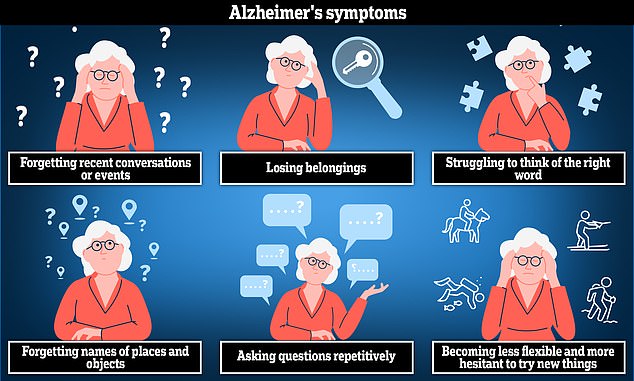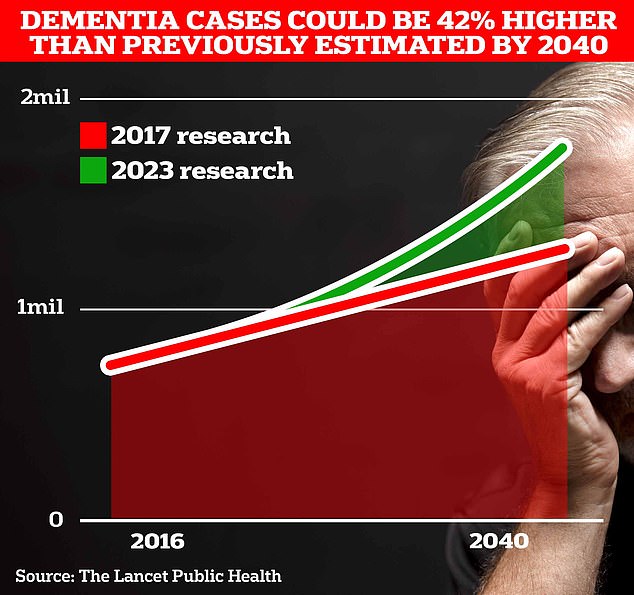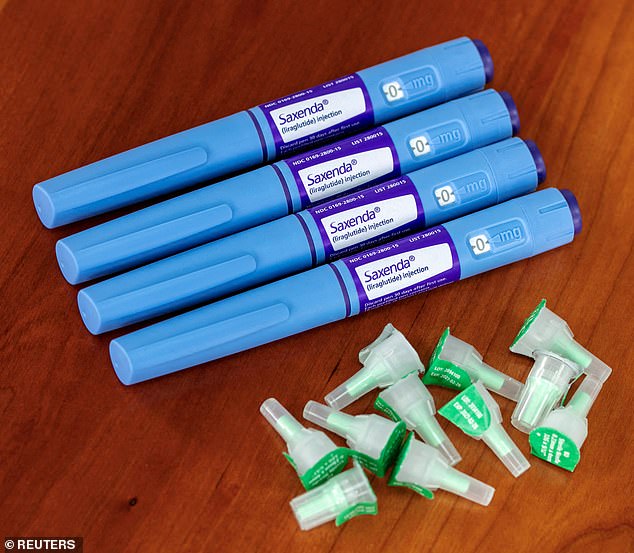An innovative diabetes vaccine already prescribed to thousands of NHS patients could reduce the risk of developing Alzheimer’s, promising research suggests.
Liraglutide, sold under the brand name Saxenda, is offered to people with type 2 diabetes because it lowers blood sugar and helps with weight loss.
Now, according to leading British experts, the once-daily injections could also slow cognitive decline by up to 18 percent after 12 months, compared with a placebo.
Researchers said today that the findings “offer hope” and could pave the way for new treatments for dementia, meaning further research is vital.
Liraglutide, sold under the brand name Saxenda, is already prescribed on the NHS to help people with type 2 diabetes manage their disease. Now, according to British experts, the injections could also slow cognitive decline by up to 18 per cent after 12 months compared with a placebo.
Dr Maria Carrillo, Chief Scientific Officer and Medical Affairs Officer at the Alzheimer’s Association, said: ‘We are in an era of unprecedented promise, with new treatments in various stages of development that slow or possibly prevent cognitive decline due to Alzheimer’s disease.
‘This research provides hope that there are more options to change the course of the disease on the horizon.
‘Repurposing drugs already approved for other diseases has the advantage of providing data and experience from previous research and practical use, so we already know a lot about their real-world effectiveness in other diseases and their side effects.’
Meanwhile, Dr Sheona Scales, director of research at Alzheimer’s Research UK, said: ‘People with dementia desperately need treatments that target different aspects of the disease if we are to continue to make progress towards a cure.
‘But developing drugs for diseases like Alzheimer’s is expensive and can take many years.
‘Being able to repurpose drugs that are already approved for other health conditions could help accelerate progress and open up new avenues for preventing or treating diseases that cause dementia, such as Alzheimer’s.
‘This new research shows that people with early-stage Alzheimer’s who took liraglutide had slower decline in memory and thinking, and less brain shrinkage, over 12 months, compared to placebo.
‘However, the study was conducted on a small group of people.
‘Larger trials are now underway to see if drugs such as liraglutide are effective in slowing the progression of Alzheimer’s disease.
‘What remains unknown is the ‘how’, and further research is needed into the mechanism behind liraglutide and its protective effect against dementia.’
In the study, researchers at Imperial College London followed 204 patients with mild Alzheimer’s at 24 clinics in the United Kingdom.
Each received a daily injection for a year: half received up to 1.8 mg of liraglutide and the others a placebo.
Before the study began, all patients also underwent detailed memory tests, PET scans and MRIs to assess brain structure and volume. These tests were repeated after one year.
The researchers also found that those who received liraglutide had nearly 50 percent less volume loss in several areas of the brain, including frontal, temporal and total gray matter.
These areas are responsible for a variety of critical functions that are often affected by Alzheimer’s disease, including memory, language, and decision-making.

Alzheimer’s disease is the most common cause of dementia. The disease can cause anxiety, confusion and short-term memory loss.

Around 900,000 Britons are currently thought to have the memory-impairing disorder. But scientists at University College London estimate this figure will rise to 1.7 million within two decades as people live longer. This is a 40% increase on the previous forecast in 2017.
The scientists will present their data today at the Alzheimer’s Association International Conference (AAIC) in Philadelphia.
Saxenda is now available in the healthcare system as a weight loss treatment.
But it is usually only prescribed after a GP refers you to a specialist weight loss management service.
It works in a similar way to semaglutide (the active ingredient in Ozempic and Wegovy) by altering the body’s metabolism, making people feel fuller and less hungry.
This leads them to eat less and, in theory, lose weight.
However, Saxenda is one of several similar drugs that are experiencing global supply shortages.
Side effects include aches, diarrhea, fever, frequent urination, and difficulty sleeping.
Manufactured by Novo Nordisk, trials have found that users lose an average of 6.4 percent of their body weight in 68 weeks.
It is estimated that around 944,000 people in the UK are living with dementia, and the figure is estimated at around 7 million in the US.
Alzheimer’s affects approximately six out of ten people with dementia.
It is thought to be caused by a buildup of amyloid and tau in the brain, which clump together to form plaques and tangles that make it difficult for the brain to function properly.
Over time, the brain struggles to cope with this damage and symptoms of dementia develop.
Memory problems, thinking and reasoning difficulties, and language problems are common early symptoms of the disease, which then worsen over time.
Dementia cases are expected to skyrocket in the coming years, so an inexpensive screening tool is vital to meet this challenge.
An analysis by Alzheimer’s Research UK found that 74,261 people died from dementia in 2022, compared with 69,178 a year earlier, making it the country’s biggest killer.

